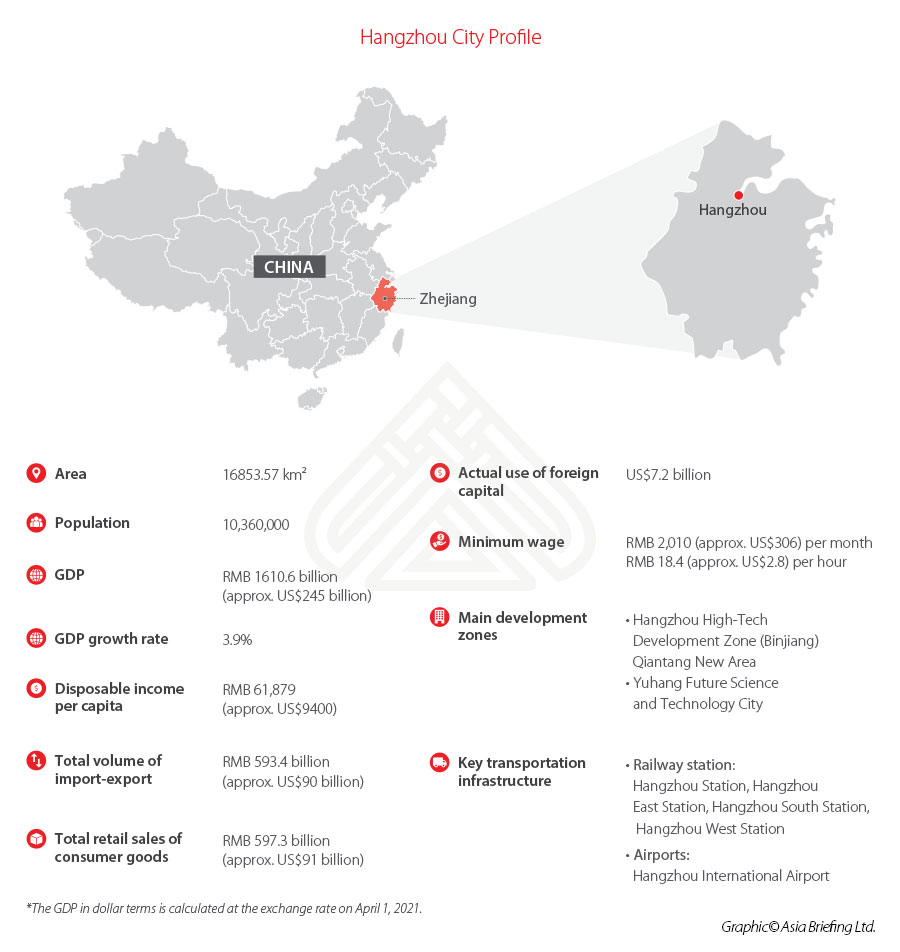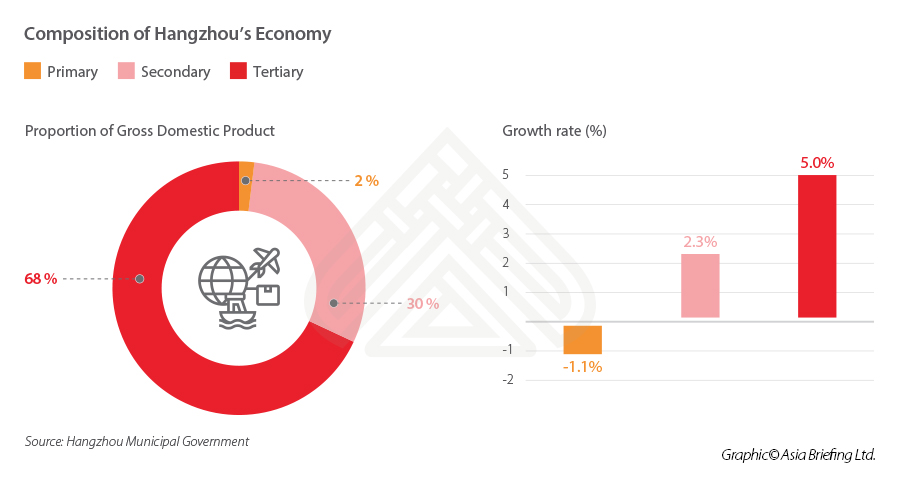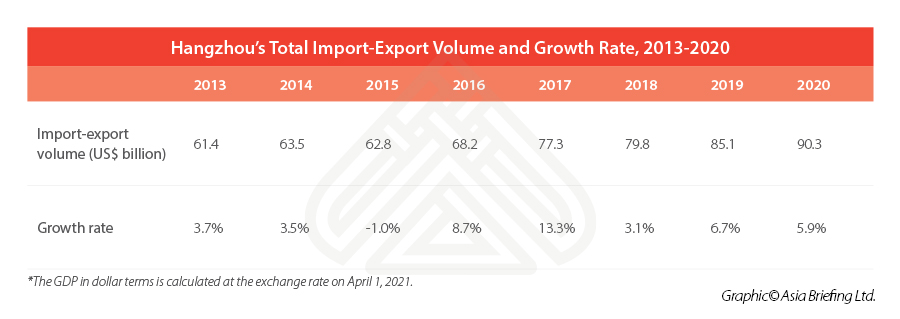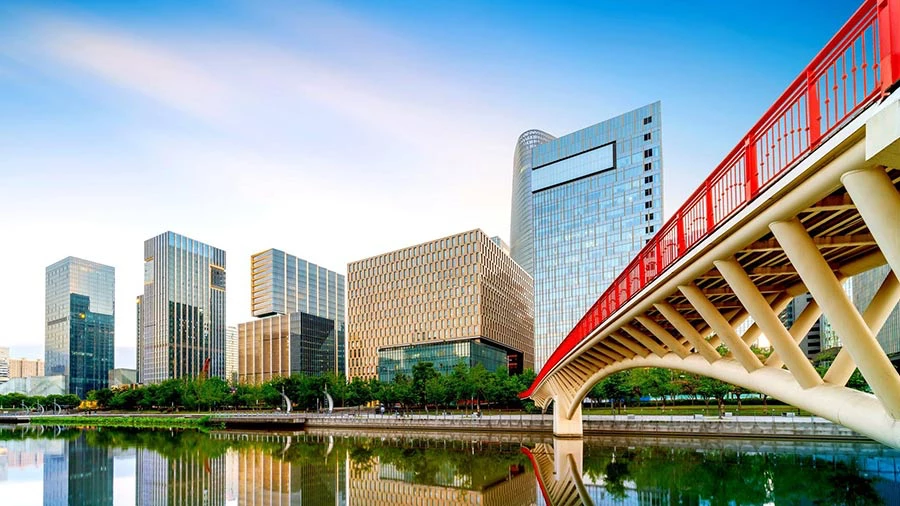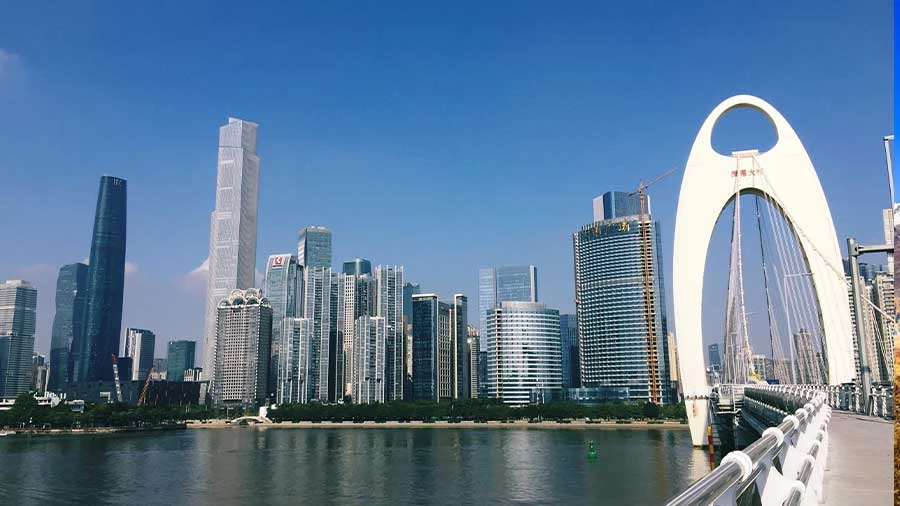Being the capital city of Zhejiang Province and home to e-commerce giant Alibaba, Hangzhou offers a unique blend of tradition and technology. It is also one of the most prosperous cities in the Yangtze River Delta (YRD) and a recognized new first tier city in China. We explore the city's thriving tech ecosystem as well as investment incentives and the various development zones, which make it a top destination for foreign investors.
Hangzhou, the capital city of Zhejiang province, has become globally well-known since hosting the G20 Summit in 2016. With lower office setup costs than Shanghai, competitive government tax incentives, and a strong network of local IT companies, Hangzhou is a city that holds great attraction for investors.
As one of the most prosperous cities in the Yangtze River Delta, located at Hangzhou Bay between Shanghai and Ningbo, Hangzhou’s GDP accounts for nearly 25 percent of Zhejiang province’s economic output. Alibaba, China’s e-commerce and tech behemoth, and Wahaha, the nation’s largest beverage company, both have their headquarters in Hangzhou.
Hangzhou’s economic profile
In 2020, Hangzhou’s GDP reached RMB 1,610.6 billion (approx. US$245 billion), making it the fourth provincial capital city with the largest GDP in Chinese Mainland. For perspective, that’s about the size of the Czech Republic’ or Portugal’s economy. Hangzhou is also one of the top three cities in the Yangtze River Delta region in terms of GDP, next only to Shanghai and Suzhou.Located in the most affluent region of east China, Hangzhou’s permanent resident per capital GDP is over US$22,000, which is comparable to the level of high-income countries, according to the World Bank. In 2020, the total retail sales of consumer goods in Hangzhou reached RMB 597.3 billion (approx. US$91 billion), also ranking the third among cities in the Yangtze River Delta following Shanghai and Suzhou.
Foreign trade and investment
In 2020, Hangzhou scored significant growth in foreign trade. Its import and exports totaling RMB 593.4 billion (approx. US$90 billion), up by 5.9 percent. Exports contributed RMB 369.3 billion (approx. US$56 billion) and were up by 2.1 percent and imports contributed RMB 224.1 billion (approx. US$34 billion), up 12.9 percent.Hangzhou’s exports to Belt and Road Initiative countries amounted to RMB 117 billion (approx. US$18 billion), up 31.7 percent. Exports to the US and 28 EU countries increased by 5.7 percent and 8.5 percent, respectively. Trade in services export totaled US$13.8 billion, up 10.8 percent.
As an e-commerce hub, Hangzhou’s imports and exports through cross-border e-commerce alone totaled RMB 108.4 billion (approx. US$16.5 billion), up 13.9 percent, accounting for about 18 percent of the city’s total trade.
The city made good use of foreign capital, attracting 804 foreign-invested projects, of which 98 projects had a total investment of over US$30 million. Hangzhou’s actual use of foreign investment stood at US$7.2 billion, up 17.5 percent. By the end of 2020, Hangzhou had received 2,019 foreign-invested projects from 222 Fortune 500 companies.
According to the data from China’s commerce ministry, the actual used foreign capital in Hangzhou accounts for more than 45 percent of that in Zhejiang province.
Investing in Hangzhou: Growth of digital economy, high-tech industries
Hangzhou’s digital economy is the leading contributor to its overall economy. In 2020, core digital industries added value of RMB 429 billion (US$65.5 billion), up 13.3 percent and contributing to 26.6 percent of its total GDP, an increase from 24.7 percent in 2019.Growth in related sectors like manufacturing of electronic information products, software and information services, digital contents, and robotics were 14.7 percent, 12.9 percent, 12.7 percent, and 12.3 percent, respectively.
The emergence of Hangzhou’s tech industry owes much to being the birthplace of Chinese e-commerce giant Alibaba, which owns e-commerce websites Taobao and Tmall, digital financial service giant Ant Group that owns Alipay, and clouding computing company Aliyun.
Leading Chinese electronic IT companies based in Hangzhou, like Aliyun, Hikvision, Dahua Technology, and Uniview, hold a sizeable market share in global markets. To be noted, Hikvision and Dahua Technology are among Chinese high-tech companies that are sanctioned and blacklisted by the US amid the deepening US-China tech rivalry.
As a city famous for its high-tech sector, the Hangzhou government actively promotes its smart city program. Alibaba and 13 other companies are now working with the local government on public private partnerships (PPP) to create smart service delivery systems for the city.
Some examples:
- Hangzhou on Palm, the world’s largest smart-app-based public bicycle system, has 3,8000 bicycles stationed at 2,500-plus docking points.
- The Hangzhou City Brain, driven by the Alibaba Group, aims to build “one network”, “one cloud”, “one data bank”, and “one nerve center”, which processes over 7.6 million API (Application Programming Interface) calls and 120 million collaborative data each day, to offer Hangzhou solutions for digitalize governance of large cities.
Where to locate your investment: Hangzhou’s development zones
Hangzhou now boasts nine state-level and four provincial-level development zones. Hangzhou high-tech Development Zone (Binjiang) and Hangzhou Economic and Technological Development Zone are among the top ranked in the comprehensive ranking of national high-tech zones and annual assessment of national economic development zones.The Hangzhou High-tech Industry Development Zone houses over two-thirds of the city’s tech companies. Notable investors in this zone include Alibaba, Microsoft, IBM, Nokia, Panasonic, and Mitsubishi.
In April 2019, Hangzhou establish the Qiantang New Area, which incorporates Hangzhou Dajiangdong Industry Cluster Zone and Hangzhou Economic and Technological Development Area.
With the goal of becoming a world-class intelligent manufacturing industrial center, Qiantang New Area has attracted big brands like Pfizer, Bayer, Geely, and Gree from various advance manufacturing industries, including semi-conductor, life and health, new materials, aerospace and aviation, and intelligent automobile and intelligent equipment industries.
Another key development zone is the Yuhang Future Science and Technology City. On April 28, 2020, Yuhang Future Science and Technology City embraced its first livestreaming e-commerce industry base, aimed to boost Hangzhou’s e-commerce economy.
To encourage enterprises to set up in Hangzhou and its development zones, the local government provides tax breaks for high-tech firms, with additional incentives for internet start-ups, including housing subsidies for entrepreneurs and events to promote private and foreign investment to support start-ups.
For more information on investing in Hangzhou or accessing the preferential policies offered by the local government, please contact us at China@dezshira.com.

